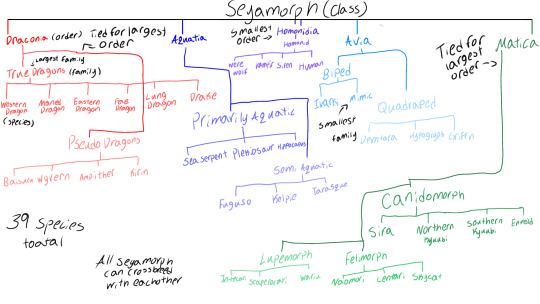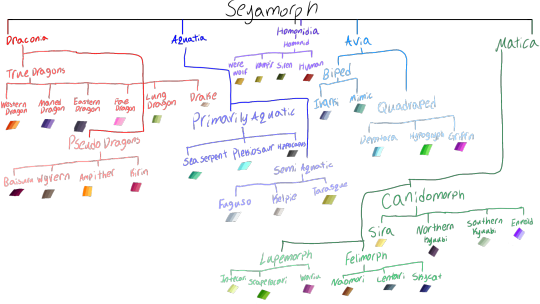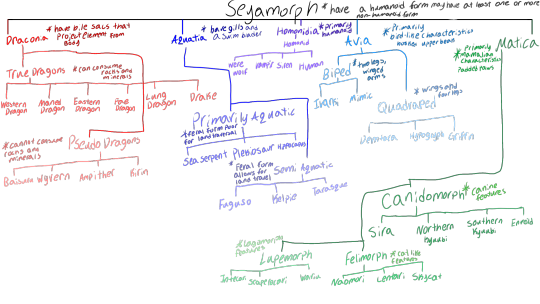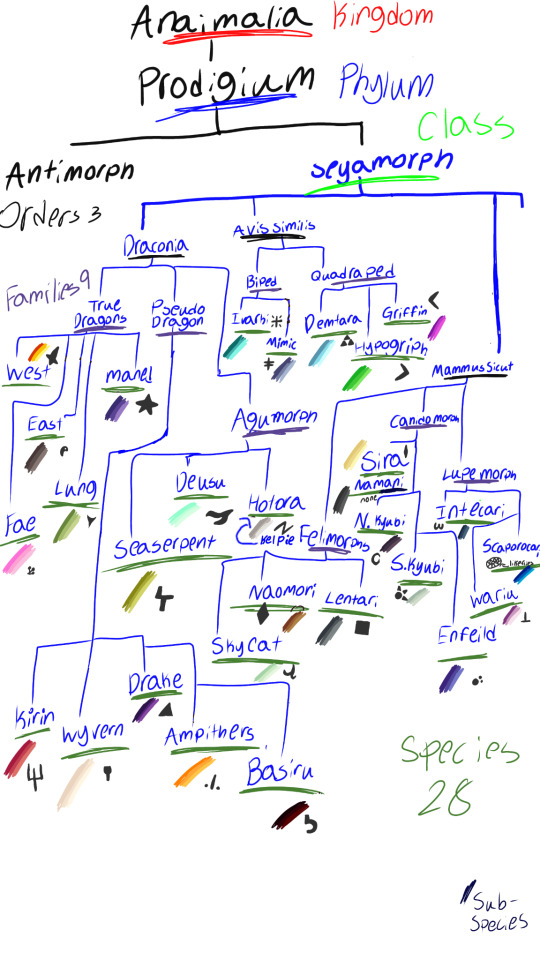#categorization
Explore tagged Tumblr posts
Note
Hey man, can you explain what the decimals in the system mean? I get that 001-099 and so on are specifics, but what do the .# mean?
The Dewey Decimal Classification system allows every non-fiction topic to be categorized under one of ten broad subjects, each starting with a different digit (see my pinned post).
Say you were looking for a book about narwhals
5XX: science 59X: zoology 599: mammals 599.5: cetacea and sirenia (aquatic mammals) 599.54: other toothed whales (most whales are under 599.52, and dolphins are under 599.53, while 599.55 is about manatees and dugongs) 599.543: narwhals
Every digit after the decimal point represents a subcategory of the previous. The more digits you add, the more specific the classification. It's turtles all the way down; some subjects are so dense that you need long strings of digits to find exactly what you're looking for. Softball is under 796.3578. Mayan folklore is under 398.2097281. The Beatles are under 782.4216609; that's the exact same number of digits as Mayan folklore, so you'd think they'd have the subcategory all to themselves, but no, they share it with a ton of other bands because it actually represents the broad topic "history, geographic treatment, and biography of specific rock songs."
Not every single subject gets that granular. In fact, most require less than six digits total because there aren't going to be that many books on any given subject to warrant that level of specificity. 551.312 represents everything to do with glaciers; whether they're from Norway or Antarctica (complete opposite sides of the globe), they share the same six digits. There's really no need for more.
But just because a topic exists doesn't necessarily mean your library will carry books about it; mine, for example, has several non-fiction books about platypuses (599.29) but none about possums (599.23). Damn shame.
Feel free to submit any posts you want me to classify, or shoot me an ask if you have a specific topic in mind.
#dewey decimal system#dewey decimal classification#library science#library#categorization#classification#ask me anything#non-fiction
51 notes
·
View notes
Text
Over time, I'm growing increasingly convinced that a lot of the craft underlying what people-into-storytelling call 'writing' isn't actually really about writing at all, and it would be useful for many people—me included—to swap over to some different term, like maybe 'storytelling'.
Because, in my experience, the goals pursued by me and by most of the people in my fiction-creation-focused social circles aren't particularly constrained to what's easy to render in prose. They're much more about conveying things to audiences, in ways which prose can certainly be helpful for but which other things can also be helpful for.
To bring up a topical example: Deltarune is a game which is very effective at its storytelling, able to deliver high-impact moments at pretty high density. And it's true that a decent chunk of that is down to being well-written; Toby Fox is, in fact, a pretty skilled wordsmith. But a lot of it is also down to other things: music, art and animation, timing, et cetera. The writing is just one component of many in the overall soup of Factors Behind Deltarune Being Good.
As such, it strikes me as worthwhile to view a lot of the skills traditionally touted as writing skills—plotting, characterization, pacing, et cetera—as, instead, more general storytelling skills. Skills which are more specifically writing skills still very much exist—various elements of how to write good prose, good dialogue, et cetera—but they're not the main mass of what most people are thinking of when they talk about writing skill. The main mass of 'writing' skills apply just as well to such things as text-free comics, voice-free animation, silent-protagonist-explores-abandoned-ruins games, and so forth, even if they're made without any writing-per-se involved in the process at all.
There are many tools which can help with telling a given story. Writing is one. But the writing isn't the story; it's just a medium through which the story can be conveyed. The difference is important.
#Archive#Writing#Categorization#Deltarune#this is a core factor in why i strongly disagree with certain literary spheres' disapproval of things like colored-text gimmicks#it's true that leaning on those gimmicks can be a crutch with which to avoid learning to convey things as clearly via prose alone#but i don't write with the goal of conveying things through prose alone! just with the goal of conveying things#avoiding those gimmicks can be a useful training exercise in the same manner as e.g. fencing with one's non-dominant hand#as a way of forcing oneself to get better at the prose portion specifically#but when trying to maximize impact one shouldn't be in training-exercise mode; one should use every tool at one's disposal#...i also suspect this is why i'm so into the visual-novel medium:#it captures most of the core upsides of traditional prose books for storytelling#while also including far more affordances to convey its ideas through other modalities as well#Visual Novels
24 notes
·
View notes
Text

Spring, 1973
Tetsuumi Tateushi, Taiwan (1905-1980)
#art#beautiful#artwork#illustration#delicate#orchid#pansies#flowers#feathers#tarot#gorgeous god dammit#categorization#shells#plants#spring aesthetic#spring#springtime#amazing art#bugs#insects#like I spy but fine art#scrumptious
22 notes
·
View notes
Text

#data visualization#understanding#aiart#digitalart#ai#categorization#art#technology#ai world#artificial intelligence
69 notes
·
View notes
Text
Spring is January - april
Summer is may- july
Fall is August - novemeber
Winter is December
5 notes
·
View notes
Note
In your latest post about regulus (asking why people like him) someone told you to check the anti regulus tag and you expressed confusion, because you never heard about the tag.
so like...I don't know if you're still confused? Because you have to use "anti (character)" tags when you're posting (character) critical content. People who love (character) can filter the tag out, that way they wouldn't have to see that type of content.
(it's fandom etiquette, also there are anti (ship) tags as well, if you don't like Jegulus or something else)
So when you answered that anon ask about Severus with criticism under only the "Severus Snape" tag without the anti Severus tag, I'm wondering if you realize this was going to come across as attack? Because it's entering Severus fan spaces, bypassing the filter?
Which means Severus fans will respond to you...hence why you're getting attacked?
Did you mean to start the argument? Or was that you not knowing how tags work? It's fine if you didn't know btw, this whole thing is just confusing me.
- 🎀
hey i'm gonna try to be nice here but this is sort of getting on my nerves.
this whole thing is confusing me so much.
i made a post about severus snape. so i tagged severus snape. because severus snape is mentioned in the post. that's how you categorize. if a book talks about cooking, you put it in the cooking section. regardless of favor, that's how you categorize. for example, people write books about thomas jefferson. one book may talk about the good things thomas jefferson did, and another may talk about the bad things thomas jefferson did. regardless of this favor or lack of favor, both books will be categorized by the topic being thomas jefferson. i don't understand why it isn't the same way here?
i love a great many fictional characters, and when i see a critique of them, i read it carefully, and then i either respond to it with my opinion, make my own post discussing my opinion, or i scroll past it. and it's great! i got to see someone else's opinion, and regardless of whether or not i agree with it, i've learned a new perspective on a character i love. why wouldn't people want the same? don't people want to learn everything about their favorite characters? don't people want rich and diverse perspectives on worlds that they adore?
besides, i think the notion that i "asked to be attacked" by posting and tagging snape is simply ridiculous. it's like me saying "i hate bread because it tastes bad and it has a funky texture." and then someone responding with "you are so stupid for hating bread. bread has all of these benefits. you're reductionist and simple for hating bread". like i didn't ask for those insults at all! all i said was that i hated bread! it would be one thing if i said "everyone who likes bread is disgusting and slimy and will never get married". but i didn't say that. i just said that i hated bread.
also if you know me (which you don't, so it is fine), then you know how i feel about censorship. i refuse to engage in censorship of any kind unless it has to do with shielding children from danger. and this is not shielding children from danger. it's having a differing opinion from my fellow man, which is one of the largest stepping stones in the pond of humanity. i refuse to hide my opinion behind an "anti" tag when someone reading it can simply stop reading it. i find the notion of trying to avoid any nuance or anything that pops your ignorant little internet bubble absolutely ridiculous and i refuse to contribute to that culture.
do i like that snape defenders are up my ass and targeting my intelligence and being horrifically rude to me for expressing an opinion? no! i despise it wholeheartedly. but at the same time, it's an engagement, a discourse, a conversation with my fellow man in which i learn more about the world. like for example, i learned that there hasn't been a single snape defender i've talked to about snape who is actually mature and decently kind. and if i had to choose between hiding the post and getting no rude replies or showing the post and getting rude replies but also an interesting perspective on something that can be interpreted in many different ways, then i'll choose the latter every time.
i have thick skin, i can take a bit of internet harassment, though i won't hesitate to complain about it, because again, it is unwarranted!
not to be rude, but i personally don't care what fandom etiquette is. i don't have to do anything. i don't care that everyone else is doing it. i'm going to do things my way, and if people don't like it, they can block me and stay in their bubbles.
#marauders#the marauders#marauders era#marauders fandom#hp marauders#severus snape#because i'm funny like that and i'm just gonna keep tagging it because well#like i said#categorization#fandom#fandom etiquette#is kinda stupid#omg omg who said that
11 notes
·
View notes
Text
rip Mr Leviticus, u would have loved discourse over whether a tomato is a vegetable or a fruit
4 notes
·
View notes
Text
#had to sacrifice sucking pigs and the tame animals#tumblr won't fucking let me get all the options there#philosophy#foucault#michel foucault#french philosophy#contemporary philosophy#postmodernism#postmodern philosophy#gender#judith butler#gender trouble#gender studies#categories#categorization#fuck sake tumblr ruins the italics for the et cetera which was way funnier
6 notes
·
View notes
Text
The valence concept not only had the virtue of simplicity and of clear and evident usefulness, it also offered the required integral property, for there seemed no possibility of valences of 1.5 or 2.32 or anything like that.*
* Actually, twentieth-century sophistication introduced new concepts of valence that did indeed include something like fractional values but does not affect the line of argument in the chapter.
"The Stars in their Courses" - Isaac Asimov
#book quotes#the stars in their courses#isaac asimov#nonfiction#essay#bridging the gaps#valence#chemistry#categorization#organization#20th century#simple#useful
2 notes
·
View notes
Text
Gamers suck at naming genres so badly.
What's that game? *oh its like that game doom I played so I guess I'll call it a doom like*
What about this? *oh that's just like that super old game rogue but a little less so it's a roguelite*
And these!? *that's an rpg because they used to have game mechanics like that for games where you played a role... but now you don't play any role and we just never bothered naming them.*
😠
15 notes
·
View notes
Text
Personally I categorize horror as follows :
Primal horror
This is the original horror - made from darkness and death and slaughter. A mixture of the visceral carnage of an animal's jaws and the slow, psychological dread of the endless
Under it, are two more :
1. Psychological Horror
2. Visceral Horror
Visceral horror is easily explanable, and its categories are generally just gorefests - bestial horror, torture-porn horror, slasher horror, spectral horror, body horror.
But it's opposite is where things get interesting
Psychological Horror is the slow build-up. Tension. Dread without payoff. It doesn't necessarily need to include gore, but often does anyways. To me at least, this type is more disturbing than visceral
Under it are :
Liminal
Proximal
Dysphoric
Somatic
Domestic
Cosmic
Religious
Pseudo-scientific
Absurdist
Liminal horror is a popular enough concept already. The idea of an endless liman - an endless margin. No past, no future. Just the eternal now. The idea of this hazy, dreamlike "world between worlds", where the cake of conventions, and reality ceases to make sense, with the looming dread that it might never make sense again. Interestingly, this is why the "uncanny valley" exists - the transition, or "liman" between the non-human and the human. Liminal horror
Proximal horror is where a familiar environment is twisted against you. An intruder in your home. Your house becoming haunted. Being attacked in a place that is supposed to make you feel safe, adding to the sense of wrongness and the overwhelming fear
Dysphoric horror is where you are trapped inside a body not your own, either of another person, or in some cases, another species. Popular examples include "Finding Mari"
Somatic horror is sleep paralysis, or coma. Being trapped inside your own body, able to think and feel and see, but not to talk or move or gesture, or so much as blink
Domestic horror is the idea that the ones you love, and that you thought you knew, are actually completely different from who you thought they were
Cosmic - everyone knows this
Religious - everyone knows this as well
Pseudo-scientific - it's obvious, right ?
Absurdist - Disturbing, bizarre imagery. Weird, unnerving things. A full-grown man with the mind of an infant, weeping and mostly-naked in a baby costume. Dolls breathing. Eyes in the dark. Milk and vomit. Blood-soaked baby clothes. Pigs snuffling around a corpse
#horror#types of horror#writing community#creative writing#writing#writers on tumblr#writeblr#categorization#psychological horror#visceral horror
10 notes
·
View notes
Text
Purpose and Technique
There are two distinct things which are both often referred to as 'style', in creative contexts like writing / art / music-composition / etc.
The first—let's call it style-of-purpose—is style in the sense of patterns in one's choices of creative objectives. What sorts of concepts or themes or emotions or aesthetics or suchlike one is looking to convey to one's audience.
The second—let's call it style-of-technique—is style in the sense of patterns in one's choices of techniques to use in pursuit of those objectives. How one fills in all the implementation-details which, while necessary to fill in to fulfill one's objectives, aren't objectives on any deeper level than that. Prose-style, in a story being told for the sake of conveying a certain plot; character-design, in an art-piece being created for the sake of conveying a certain sort of brushwork; described events, in a set of song-lyrics written for the sake of conveying a a certain sort of feeling; et cetera.
Style-of-purpose is pretty much inevitable for anyone engaging in deliberate production or presentation of creative work for an audience. There's no practical way to avoid it, and not much reason to want to. Style-of-purpose is a habit, but not a constraint: it doesn't prevent you from doing what you want to do, but rather emerges naturally from doing what you want to do.
Style-of-technique, on the other hand, can very easily turn into a constraint. A technique effective in pursuit of one work's objectives can easily be counterproductive in another work. Someone who leans heavily on Hardboiled Detective Narration might have some trouble conveying their desired tone when trying to write a (prototypical, non-subversive) cute-girls-doing-cute-things story about water-skiing, for example.
As such, it's important, when doing creative work in any field where one intends to create new material, as opposed to just variations on the same themes over and over again, to have range. To practice a varied and ideally ever-growing array of different techniques one can use in any given part of one's work, so that no matter what one's creative objectives are one can pursue them effectively. Developing a strong distinctive style-of-technique across one's works, then, is a trap: an artist with that sort of style is one who isn't getting enough practice doing anything else, and who accordingly will have trouble doing anything else when they want to.
It's very easy to fall into a feedback-loop of finding a single effective technique in a given domain—a method of narration one is good at, or of lineart-drawing, or suchlike—and then, since that's the technique with which one produces one's best work, to use it and neglect other techniques. The longer one does this for, the larger the gap in quality between one's output with that technique and others grows, and the more tempting it becomes to keep on using that technique more and others less. And thus the less able one becomes to create works up to one's quality standards with any other techniques, even when those other techniques would, if performed with the benefit of practice, lead to more effective realization of one's artistic aims.
People talk a lot about trying to find their styles, when doing creative work. This is fine, when it comes to style-of-purpose. But, for style-of-technique, I recommend against trying to develop it for oneself, and in fact recommend actively avoiding developing it; it's far too easy to become trapped in a niche narrower than one can comfortably fit in.
#Archive#Categorization#Writing#there's an explore/exploit tradeoff here in that any given person has limited time to practice and so can't become top-tier at everything#so someone looking to make top-tier work in one field might need to voluntarily walk into the style-of-technique trap eventually#but at the very least they should do so in full awareness of exactly what limits they're drawing around themselves#and make sure those limits are better for them than whatever alternatives might be available#...possibly i should have a category tag for creative-work-in-broad-generality?
46 notes
·
View notes
Text
The Philosophy of Concepts
The philosophy of concepts is a branch of philosophy that investigates the nature, structure, and function of concepts in our thinking and communication. Concepts are the mental representations or units of thought that enable us to categorize and make sense of the world. Here are some key areas explored within the philosophy of concepts:
1. Nature of Concepts
Mental Representations: Concepts are often understood as mental representations that play a fundamental role in our cognitive processes. They are the building blocks of thoughts and allow us to understand and interact with the world.
Abstract Entities: Some philosophers view concepts as abstract entities that exist independently of individual minds, akin to Platonic forms or universals.
2. Acquisition of Concepts
Innateness vs. Learning: There is a debate over whether concepts are innate (inborn) or acquired through experience and learning. Nativists argue that certain fundamental concepts are hardwired into our brains, while empiricists believe that all concepts are learned through sensory experience.
Developmental Psychology: This area studies how children acquire and develop concepts as they grow, shedding light on the cognitive processes involved in concept formation.
3. Structure of Concepts
Classical Theory: The classical theory posits that concepts have a definitional structure, with necessary and sufficient conditions for membership (e.g., a triangle is defined as a three-sided polygon).
Prototype Theory: This theory suggests that concepts are organized around typical examples or prototypes, rather than strict definitions. For instance, the concept of "bird" might be centered around a prototypical bird like a robin.
Theory-Theory: According to this view, concepts are like theoretical constructs that are part of our mental theories about the world. They are embedded in a network of beliefs and assumptions.
4. Function of Concepts
Categorization: Concepts allow us to categorize objects, events, and ideas, making it easier to navigate and understand the world.
Communication: Concepts enable effective communication by providing a shared framework for discussing and understanding ideas.
Inference and Reasoning: Concepts facilitate inference and reasoning by allowing us to draw connections between different pieces of information.
5. Conceptual Change
Scientific Revolutions: The philosophy of science explores how concepts change in response to new discoveries and paradigm shifts, as seen in scientific revolutions.
Conceptual Change in Individuals: This area examines how individuals revise their concepts over time in response to new experiences and information.
6. Philosophical Implications
Epistemology: Concepts are central to epistemology, the study of knowledge. Understanding how concepts are formed and justified is crucial for understanding how we know what we know.
Metaphysics: The nature of concepts raises questions about the nature of reality and the relationship between our mental representations and the external world.
Philosophy of Language: Concepts are closely related to language, and the philosophy of language investigates how words and sentences express concepts.
Conclusion
The philosophy of concepts is a rich and interdisciplinary field that intersects with cognitive science, psychology, linguistics, and artificial intelligence. It seeks to understand the fundamental units of thought that underpin our cognitive abilities and shape our understanding of the world.
#philosophy#epistemology#knowledge#learning#chatgpt#education#ontology#metaphysics#psychology#Concepts#CognitiveScience#PhilosophyOfLanguage#Linguistics#MindAndBrain#AbstractEntities#MentalRepresentations#PrototypeTheory#TheoryTheory#Categorization#ConceptualChange
3 notes
·
View notes
Text
I LOVE CATEGORIZING SHIT!!! WOE TAXONOMY CHART BE UPON YE!!

Blood colors

Category distinctions

I don't have refs for most of these, but I felt the primal urge to sort things
Not gonna lie, I think I might be neuro divergent
Lemme know if yall want non transparent versions.
I decided to go back to some old ideas and I'm going to radically restructure my world building.
(Gross old taxonomy chart btw)

They all used to have special pupil shapes, but that was annoying tbh
This shit was hard to read if you weren't me.
#fictional taxonomy chart#my oc shit#ibispaint my beloved#oc#my oc story#osuri#categorization#sorting things#worldbuilding
2 notes
·
View notes
